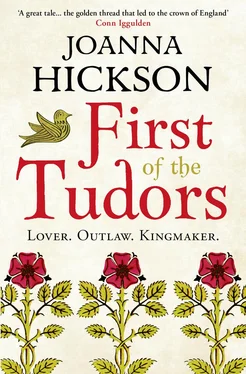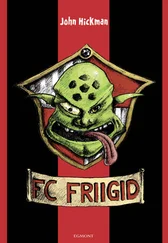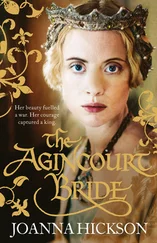I angrily rejected his implication that I had lecherous designs on Jane. ‘The only bedding I have done here is strawing down the horses, brother – and for pity’s sake will you please stop calling me Jas!’
‘Temper, temper!’ he cried. ‘What does plain Jane call you then? Rust-head?’
‘No, but I will tell you what she calls you. Pretty boy! You frightened the sheep in your bright red doublet and yellow hose – you should have left them in London.’
‘And you should leave those mud-coloured rags of yours in Wales,’ he retaliated. ‘Along with your Welsh words and your bumpkin shepherdess – Jas!’ He had to dodge under his horse’s neck to avoid my bunched fist.
When we did return to court, however, it was not our clothes or my language which sparked a bout of teasing from our fellow squires but the tanned faces we had acquired after three months in field and saddle, weeks which we had both greatly enjoyed, no matter how much Edmund protested that he had stagnated in the ‘rural backwaters’ as he called West Wales.
But there was no prospect of a return to Wales. Memories of Jane were all I was ever likely to have, for now that Edmund and I had both reached our majority our brother the king often summoned us into his company, significantly more than the other household squires. I suspected that this was due to prompting by Queen Marguerite, who seemed to relish the notion that we were first cousins; her father’s sister, Marie of Anjou, was also our aunt by marriage, being queen to our late mother’s brother, King Charles VII of France.
‘But we cannot make anything of this in the court,’ she warned privately, in what I considered her rather charmingly broken English, ‘because King Henry is still le Roi de France , however successful are the armies of our Uncle Charles in Normandy and Maine.’
It was a moot point. According to the peace treaty that had married our mother to Henry’s father, he was officially king of France as well as England. But his commanders were gradually and ingloriously losing the vast swathes of French territory conquered by the fifth Henry and the peace of the realm was seriously threatened by hordes of displaced soldiers who, having settled in Normandy and Maine with their families, were now forced to flee the invading armies of King Charles and return to England, where many of them roamed the shires, homeless, penniless and desperate, stirring up trouble. This series of military setbacks had also drained the royal coffers and caused a dangerous split in the ranks of the English nobility. Earlier in the year the king’s distant cousin, Richard, Duke of York, who publicly lamented these failures, had been banished from court for bringing an army to London, demanding to be given command of the French wars and named as Henry’s heir.
It was Queen Marguerite who told us that she and the king were going on a Royal Progress and Henry desired that Edmund and I accompany them, not as his household squires but as his brothers. ‘Henry will dispense justice to all the poor people who have been robbed and attacked by these renegades from France,’ she explained.
This was undoubtedly an honour, intended to give us an intimate knowledge of our brother’s duties and beliefs. We were to lodge near the royal apartments and share the private solar.
I learned a great deal during that Progress about the way the king’s justice was dispensed, and discovered the enormous discrepancy between those nobles who were actively involved and compassionate overlords and those who dealt with their tenants at third and fourth hand, often using unscrupulous methods of extracting their rents and revenues.
I also found out a great deal about the king and queen themselves. They treated each other with unfailing courtesy but little apparent affection; the private time we spent with them significantly lacked laughter or casual exchange of the kind I expected between two people who had been joined in matrimony for more than six years. In fact, I felt there was a constant, underlying tension, which puzzled me. Of course love was no prerequisite in a dynastic marriage such as theirs but Henry scarcely seemed to notice that Queen Marguerite was undeniably lovely, with an exotic beauty and a graceful figure that elicited furtive but appreciative glances from most of the young men about court. He refrained from any comment on her dress or appearance unless he thought it too elaborate or excessively extravagant. He himself dressed more like a cleric than monarch despite Marguerite urging him to adopt the bright fabrics and brilliant jewels she considered appropriate to the royal state.
She sought our support in this endeavour. ‘The people expect splendour of their king, do you not think? Edmund – you must agree for you are always á la mode . Perhaps you might advise his grace on what the nobility are wearing? I notice that the hems of the young courtiers’ gowns are getting shorter, their hose is more colourful and their jewellery more lavish but I cannot persuade Henry to adopt this style. He dresses as if every day were Vendredi Saint .’
Nevertheless Henry continued to avoid splendour, even when attending the opulent feasts provided by our hosts during the Progress, all of them anxious to please their sovereign, hopeful of obtaining some reward. These occasions provided opportunities for dancing and masking, when many young male courtiers chose to display their physiques, stretching their hose tightly over their thighs and exposing more leg than would be wise in cold weather. King Henry certainly enjoyed a mask, especially if it was based on a biblical theme but his habit was to retire to his private chamber before the evening entertainment became too boisterous.
Usually and much to Edmund’s vexation, he asked the two of us to retire with him. Henry then chose to drink small ale and talk over the events of the day, such as the judicial cases he had heard at the local assizes or a visit he had made to a religious shrine. As strains of dance music drifted through open windows, Edmund’s feet would start tapping out the rhythm, while he strove to preserve an expression of rapt interest in the king’s discourse. I confess that I was often guilty of this myself and reminded of the countless times our greybeard tutors had droned on about the Rule of St Benedict or the writings of St Gregory while beams of sunshine beckoned us outdoors to the joust or the hunting field.
Henry’s cousin and chief counsellor Edmund Beaufort, Duke of Somerset, joined the Progress for its final days during a stay at Reading Abbey. We shared our brother’s evening ale as usual and on this occasion so did the duke, a man well known to us. We had good cause to pay him full attention. As a young man, with less status and influence than he commanded now, Edmund Beaufort had proposed marriage to our mother, the dowager Queen Catherine, but the royal council had vetoed the match. Subsequently he had discovered her clandestine marriage to Owen Tudor but agreed to keep it secret and stand godfather to their first son who was named Edmund in his honour. Ever since then he had proved a staunch friend to us and so his presence that evening was highly significant.
The abbot had surrendered his Great Chamber to royal occupation; a huge vaulted and panelled room in which even King Henry’s substantial travelling bedstead looked like a campaign cot. All the doors and windows were closed and the heat of the summer day lingered stiflingly beyond the dusk so that I longed to loosen my collar and open the front of my doublet, under which my shirt clung to me, damp with sweat. The duke and the king sat in carved oak armchairs in front of the empty hearth, two cushioned stools placed before them.
After we had been invited to sit in the king’s presence it was the duke who spoke first. ‘His grace is grateful for the company you have both afforded him during this Royal Progress. He is much comforted by the unflinching loyalty of his two brothers, to him and to his queen, and he has decided that the time has come to show you his favour.’
Читать дальше












